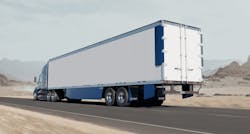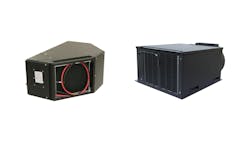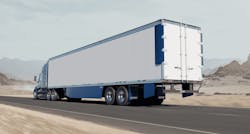Transtex acquires APU provider DClimate
Transtex, known for helping increase tractor-trailer fuel efficiency with aero kits and side skirts, has acquired APU developer DClimate, and now will be helping cut fuel costs while the truck is idling as well.
While there is a current debate over diesel vs. electric APUs, DClimate elected to use both to leverage electric APUs' ease of maintenance and diesel APUs' reliability. The approach enables idle reduction, improves driver comfort, and increases battery longevity, all while improving sustainability efforts. The system is EPA SmartWay Verified and meets both CARB and EPA emissions requirements with its 48V HVAC module and battery management and rapid recharge system. DClimate also offers battery mangament technolgy.
"We firmly believe that DClimate’s APUs have the capacity to set the industry standard," stated Mathieu Boivin, CEO of TRANSTEX. "Their team’s advanced engineering expertise aligns with ours, enhancing our product line with innovative solutions to further optimize our customers’ operations. This acquisition reinforces our position in an industry we know well, propelling sustained growth in our business."
On its own, TRANSTEX offers aerodynamic tools to reduce the nearly 2/3rds of the energy allotment engines spend to overcome drag. These products include the Edge Topkit+ for trailers, Edge Skirts, the T-Flex Blue Bracket, and Edge Flaps, all of which work to reduce drag and increase aerodynamic efficiency. But the acquisition has allowed the company to expand its portfolio and offer customers greater fuel efficiency opportunities.
Read more: Product Spotlight: Auxiliary Power Units
“To maintain their competitive edge, our customers rely on our aerodynamic products,” explained Todd McGuire, senior vice president of Sales and Marketing at TRANSTEX. “Given our expertise, they often seek solutions beyond aerodynamics to cut operational costs. By integrating DClimate’s APUs into our portfolio, we directly address this demand, empowering fleets to enhance driver comfort, optimize fuel efficiency, and reduce emissions throughout their journey, even during mandated rest periods.”
Now, fleets will be able to secure systems to increase their efficiency and decrease engine wear and tear, both on and off the road, all in one place.
About the Author

Alex Keenan
Alex Keenan is an Associate Editor for Fleet Maintenance magazine. She has written on a variety of topics for the past several years and recently joined the transportation industry, reviewing content covering technician challenges and breaking industry news. She holds a bachelor's degree in English from Colorado State University in Fort Collins, Colorado.


